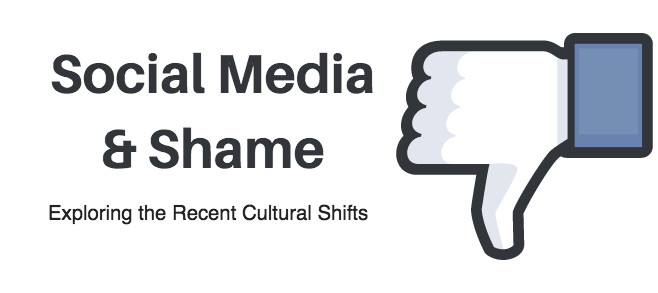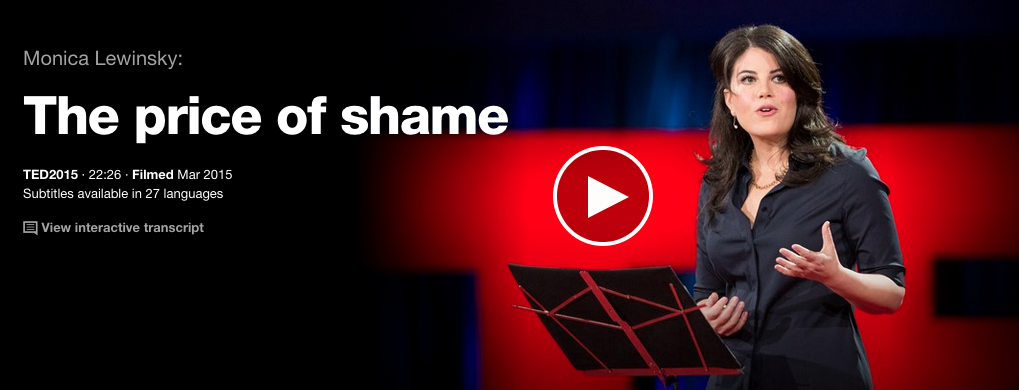2 Ways Social Media Fuels Shame
Shame is the result of two things: expectations and exposure. The constant whispers of shame are “You’re not who you should be!” (expectations) and “They’re gonna find out who you really are!” (exposure). Consequently, we strive to live up to expectations and to avoid exposure.
A (relatively) recent invention has created entirely new levels of both expectations and exposure for people in the modern world. It’s called “social media.” The myth of progress and civilization battled hard to eradicate shame from Western culture. And they nearly did…until Facebook and Twitter rode into town.
- The expectations induced from social media come not from the advertisements in our feeds, but from the images of our peers’ amazing life. We no longer have to keep up with the Jones on the screen, but the hundreds of Jones we now “follow.” (I’ve recounted elements of my social story here.)
2. Regarding exposure, social media has virtually dismantled the private/public dichotomy.Anyone’s smartphone has the power to capture and broadcast one misspoken word or untimely gesture. What you do anywhere anytime can be revealed to the entire world. By fueling heightened levels of expectations and exposure, social media has become a new cultural arena for honor and shame. The recent emergence of “internet shaming” and “cyber bullying” testifies to this significant cultural shift: our reputation is now digital.
Technology has revealed the heights of human achievement as well as its lowest depths and idolatries. Consequently, there has been substantial reflection on shame and social media.
The five articles (and one video) below are well-researched and insightful. I highly recommend them.
- “The Return of Shame,” by Andy Crouch at Christianity Today. As shame becomes a dominant force in Western culture, Christians become more open to understanding shame in the Bible.
- “Rage, Public Shaming and Modern-Day Pharisees,” by Scott Sauls at Relevant. A pastoral reflection on the dangers of the online mob mentality, and how to overcome “outrage porn.”
- “The New Nonconformist Conscience” at First Things. A historical look at how Christians have applied shaming to enforce public ethics.
- “How One Stupid Tweet Blew Up Justine Stucco’s Life” at The New York Times. An examination of various lives ruined by public shaming.
- “The Shaming of Izzy Laxaman” at Slate. When a girl kills herself after her father cuts her hair, it repeats the stories of public shaming in medieval history.
And finally, Monica Lewinsky has an excellent TED talk titled The Price of Shame. “Public shaming as a blood sport has to stop,” she says. “I was Patient Zero of losing a personal reputation on a global scale almost instantaneously.”




In light of the convenience with which we can indulge, it becomes increasingly important that Christians restrain the urge to shame their opponents. It was embarrassing enough when Christians used print media to attack their opponents’ character rather than engaging their ideas. At least much of the non-Christian world ignored the books and journals where Christians aired their dirty laundry. Now, thanks to social media, both our family squabbles and our fortress mentality have become entertainment that is easily accessible to anyone who cares to ridicule our faith.
Here’s my rant:
Now more than ever, we need to examine the fears that drive us to engage in this shaming (and shameful) behaviour. How can we restore the public honour that belongs to our Saviour’s name? There is definitely a place for apologetics and even polemic contention for Biblical truth. However we need to demonstrate to the world that we are capable of respectful dialog that honours the opponent while disagreeing with his or her conclusions. Without that, we fit the stereotype of the crackpot much more closely than a follower of Christ who can be taken seriously. Of course, when we are fearful that an opponent might demolish our beliefs with his arguments it is much more difficult to maintain a respectful dialog. If the media we chose to consume (read/listen to) is mainly spiteful diatribes with which we agree, we will not build the foundation of faith that provides us the confidence to be respectful in “contending for the faith”.
So I wrote this some time ago, then waited to post it while considering a suitable conclusion. I found my conclusion in Seth Goodin’s blog. Seth puts it so concisely, “the best way to avoid (using) contempt is to look for your fear.”
Jim,
Yes, good word. The threat and fear of shame from others is often the cause of shaming others.
The Holy Spirit can replace a dark desire to bring a christian brother or sister down by publicly shaming them and inculcate a desire to cover the shame because of love and honor. This could be interpreted as being disingenuous, but we are actually honoring God in doing so. Shem and Japheth covered their father’s fault and nakedness and walked backwards to show respect and would not look on their father’s shame. Ham saw and proclaimed his father’s nakedness to his brothers. He received the censure from his father in the form of a curse and a missed blessing. Covering shame does not give us liberty to not address the unacceptable behavior within our own fellowships. This being said, we can recognize that there is a fleshly penchant within us that revels in the misdeeds and misfortune of others. We should think twice and fear,(in the sense of the fear of God),before exposing a brother in the Lord to ignominy and public shame; and this in front of those who don’t know or love God. I believe the rebuke that Jesus gave his disciples here applies to this form of dishonoring,”You do not know what spirit you are of.” I agree that fear of having our own shame exposed could lead us to desire to expose others. Christ bore our shame and took it upon himself on the cross. He covers the child of God’s shame and replaces it with His honor. It is now imperative to hold Christ’s name in the utmost honor which means dealing with internal issues in a God honoring way and protecting His name by covering the shame of His children in front of the public at large if possible. If the shameful deed must be known because of legal or ethical obligation we should not take sinful pleasure in it or add or voice to the crowd. Covering shame in a godly way and seeking to expose it in an ungodly way are two diametrically opposed phenomena.